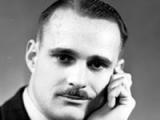What happened that day?
See historic events for any day of the year by entering the date below. Why not try your birthday?
Kiwi of the Week
Today in History

1974 William Sutch charged with spying
The New Zealand Security Intelligence Service (NZSIS) aimed to catch Sutch in the act of passing information to Dimitri Aleksandrovick Razgovorov, a Russian diplomat. The pair had been under surveillance since April, after the NZSIS chanced upon what they believed was a clandestine meeting between them. They believed that if caught in the act Sutch would come clean and cooperate with them.
At approximately 8.40 p.m. on 26 September, Sutch was detained by police assisting the NZSIS with their operation in Aro Valley, Wellington. He was told that he had been observed meeting a Russian on three occasions, including that evening. Sutch responded that this was 'preposterous' before being taken to Wellington Central Police Station for further questioning. Here he acknowledged that he might have met Razgovorov socially, 'but not under the circumstances outlined by the police'.
Several hours later Sutch accompanied officers to his home, where he permitted the NZSIS to assist police in their search of the property. At around 3.30 a.m. he was taken back to the station and arrested under Section 3 (1) c of the Official Secrets Act 1951. The charge read out in court later that morning was that between April and 26 September 1974, for a purpose prejudicial to the safety or interest of the State, he obtained information which was calculated to be directly or indirectly useful to an enemy.
Following his arrest Sutch told police he had nothing to say and sought legal advice. On 17 October he wrote to the Attorney-General, Dr Martyn Finlay, whose authorisation was required for the prosecution to proceed. In this letter Sutch explained that he had met with a Russian he had been approached by at a social gathering because he was interested in what the man had to say. Despite this explanation Finlay was 'satisfied that the material presented to him warranted further consideration in open court'. He authorised proceedings to continue. At the conclusion of the case's preliminary hearing on 25 October, Sutch pleaded not guilty. The magistrate determined that a prima facie case had been made and committed him to the Supreme Court for trial.
The trial began on 17 February 1975 and lasted five days. The Crown's case focused on the evidence of NZSIS and police officers who testified to the meetings between Razgovorov and Sutch, and to the latter's initial denial that he knew or had met with Razgovorov. The defence argued that Sutch had initially denied meeting with Razgovorov because he was embarrassed and confused, rather than because he had anything to hide. They sought to paint Sutch as a loyal New Zealander, calling character witnesses who included Phillip Holloway, New Zealand's Ambassador to Italy.
In its final address the Crown argued that the 'surreptitious and clandestine' nature of the meetings implied that Sutch had information useful to an enemy. But defence counsel Mike Bungay asked 'how anyone could say it was prejudicial to the State when it was not known what the information was'?
The jury retired on 21 February. After approximately seven hours' deliberation they returned with a not guilty verdict. Sutch returned to his work at the Queen Elizabeth II Arts Council. But his health had suffered during the trial. In mid-September he was admitted to hospital. He died on 28 September 1975, just a year after his arrest.
When his security file was released in June 2008, Graeme Hunt, author of Spies and Revolutionaries: A History of New Zealand Subversion, claimed that it confirmed that Sutch was a spy. Meanwhile, the Sutch family and author Brian Easton, who devoted two chapters to Sutch in his book The Nationbuilders, argued that the information released supported the jury's decision to acquit Sutch. Easton commented that 'there is no evidence in the just-released papers – nor apparently anywhere else – that he was [a spy]'.
Image: William Sutch (DNZB)














